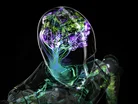Revolutionising Mental Health Care with Digital Innovation

With the World Health Organization (WHO) revealing that a significant portion of the globe may grapple with mental health issues at some point, the topic has escalated to a worldwide concern.
Yet, the global access to mental health professionals showcases vast inequalities, with a stark median of 13 mental health workers for every 100,000 individuals.
Such disparities are further pronounced when comparing the resources between affluent and impoverished nations, demonstrating a staggering access gap in mental health services up to 40 times.
However, with AI's integration into the healthcare scene, from streamlining hospital operations to advancing personalised genetic treatments, its impact on therapeutic services has been groundbreaking.
A notch above, Therapyside, a Madrid-headquartered startup and a shining star in Nvidia's Inception programme for revolutionary startups, tackles the mental health care shortage with its AI-embedded online therapy platform.
Nvidia is best known for its graphics processing units (GPUs), but it has become a key player in the generative AI boom and metaverse development. Its Omniverse platform provides tools for creating and connecting 3D virtual worlds, supporting real-time collaboration and simulation. Nvidia's hardware and software solutions power various metaverse applications.
- Transcription: It converts speech to text using advanced speech recognition technology
- Summarisation: It creates concise summaries of therapy sessions
- Virtual assistance: An AI assistant named Maia helps therapists by answering questions and providing relevant information
Nvidia's boost to Therapyside's AI-driven endeavours
Globally, innovative tech solutions are reshaping mental health care delivery. Utilising Nvidia's NIM inference microservice, Therapyside enhances its platform with AI-generated assistants and note-takers, liberating therapists to concentrate more on their clients.
"In a therapy setting, having a strong alliance between counsellor and client is everything," said Alessandro De Sario, Therapyside's founder and CEO. “When a therapist can focus on the session without worrying about note-taking, they can reach that level of trust and connection much quicker."
The incorporation of several AI prototypes not only enriches therapy sessions but also optimises therapists' time, potentially allowing them to engage with more clients efficiently.
Additionally, Therapyside introduces Maia, a virtual assistant engineered with retrieval-augmented generation (RAG) for answering therapists' inquiries based upon session records and summaries.
Bolstering the therapist-client bond
Therapyside now aids around 1,000 licensed therapists across Europe, providing sessions in English, Italian and Spanish.
So far, the platform has hosted over 500,000 therapy sessions virtually.
With its AI tools still in beta, therapists can welcome their clients to participate, receiving promising early feedback for improved session engagement and client recall.
"It's incredibly helpful to have a personalised summary with a transcription that highlights the most important points from each session I have with my patients," said Alejandro A., a receptive therapist in the beta project. “I've been pleasantly surprised by its ability to identify the most significant areas to focus on with each patient."
Furthermore, the AI-assisted Maia facilitates therapists in promptly recalling clients' specific information, aiding in deeper, more personalised discussions.
The backend mechanics and vision ahead
Built on Nvidia's GPUs within a secure cloud setup, Therapyside's AI infrastructure utilises both Nvidia NIM and Nvidia Riva NIM for deploying AI models and ensuring accurate speech recognition.
The startup also leverages advanced AI technologies from Meta and Nvidia for powering Maia.
Looking forward, Therapyside aims to tailor Maia for supporting distinct therapeutic styles, such as cognitive behavioural therapy and psychodynamic therapy.
Moreover, to fortify AI chatbot interactions' safety, Nvidia NeMo Guardrails, an open-source security toolkit, is being integrated.
"We've just opened the door," said Alessandro. "We want to make the tool much more powerful so it can handle administrative tasks like calendar management and patient follow-up, or remind therapists of topics they should cover in a given session."
******
Make sure you check out the latest industry news and insights at Healthcare Digital and also sign up to our global conference series - Tech & AI LIVE 2024
******
Healthcare Digital is a BizClik brand




